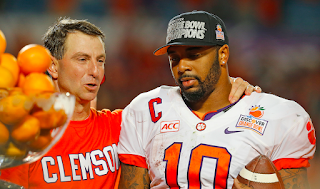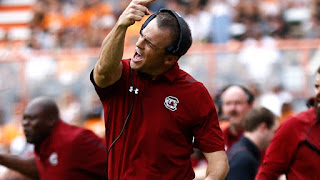Clemson's Swinney's remarks on race fall short after George Floyd murder
Sports has alwasy been a distraction from upheavel occurring in the world, and at times unifier. Going back to Preston Eagleson breaking college football's color barrier at Indiana in 1890, or when Jackie Robinson was finally allowed to play in Major League Baseball back in April of 1947, sports has at times been the proving ground for social progress, especially in America.
While the Coronavirus has put sports on hold, sports figures and leaders have been looked on to put the murder of George Floyd, and overall race relations in the country, and give a nuanced perspective.
National Basketball Association coaches Steve Kerr and Greg Popovich, of Golden State and San Antonio respectively, each praised the the 2016 kneeling protests of former NFL quarterback Colin Kapernich, when he attempted to bring attention to police accountability as it related to the African-American community.
The college ranks have also seen coaches come out in support of the protests since Floyd was killed by police officer Derek Chauvin after Chauvin kneeled on Floyd's neck for nearly nine minutes, resulting in choking him death, according to an independent autopsy released June 1.
Vanderbilt head coach Derek Mason released the following statement through his Twitter.
The exhaustion and anger felt by people of color is a direct result of seeing scenarios like this play out again and again. We are constantly reminded to speak a certain way, behave in a respectful manner and stay out of situations that make you a target.
— Derek Mason (@CoachDerekMason) May 30, 2020
Arizona head coach Kevin Sumlin posted a two-image response.
One of two. pic.twitter.com/gSc5ScEAgl
— Kevin Sumlin (@CoachSumlin) May 31, 2020
Clemson's Dabo Swinney also commented on June 1. His full comments are below.
"We are all hurting for the Floyd family, and our country. I can speak for our entire staff and team in that regards. We have all witnessed disgusting acts of evil over the past week here. We are all hurting for the Floyd family, and our country. I can speak for our entire staff and team in that regards. We have all witnessed disgusting acts of evil over the past week here."
"There's no question that these are challenging times, when there is no challenge, there is no change. We all have to accept the challenge to help change."
On the surface, a concise, short response. To be clear, Swinney says nothing wrong here. It feels like he is just scratching the surface and giving a response because he has to.
The reason Swinney is receiving the luke warm reception nationally is because he is usually far more vocal and willing to talk, at length, on virtually everything.
Compare what he said to this response about Kaepernich's protests, which Swinney speaks on, without holding much back, for nearly 10 minutes.
So where was this Dabo Swinney when asked about the horrific murder of a man, and the following peaceful protests, along with the riots and overall systemic problem of law enforcement and its relationship to neighborhoods of color?
Contrast Swinney's response to George Floyd to Clemson men's basketball coach Brad Brownell, a coach is not known as a very talkative interview.
— Coach Brad Brownell (@Coach_Brownell) June 3, 2020
This string of incidents has given coaches, especially white coaches, the chance to truly dig in deep with their players and learn about their experiences, the same way we all have been given that opportunity.
It would seem the least many white coaches could do, considering a big reason for their success comes at the expense of many black athletes, especially in football and basketball.
At least publicly, Brownell and many other college and professional coaches have voiced that. Swinney's comment did not.
Pair that with the recent news that Clemson assistant Danny Pearman, who is white, called a black player at practice the N-word in 2017 and players were reportedly disuaded from going to a sit-in protest on campus with race at the epicenter that same year, and the optics do not look favorable.
Pearman has apologized publicly since news came out, and he apologized to the player after it happened according to former players DJ Greenlee and Kenyon Tuttle.
(I would still argue that word should not even been in the back of his mind.)
There is nothing wrong with a coach, player, politican, or averge joe and jane on the street to say it is different growing up and living day-to-day in this country depending on your skin color. Or to admit there are still deep-seeded, systemic problems centuries old that we have not come to full reconcilation on.
Or the fact that there is a long line of black people assaulted and or killed by law enforcement, going back to Rodney King, to Eric Garner, to Tymir Rice, to Philando Castile to George Floyd, and many others, for either no crime, or non-violent crime where excessive force is consistenly used, disproportionatly to that of white suspects.
It may be telling though that we as a society, especially now, look to coaches and athletes for nuance and leadership instead of our elected officials.
Of course Jon Stewart talked about this exact issue during the Ferguson, Missouri protests in 2014.




Comments
Post a Comment